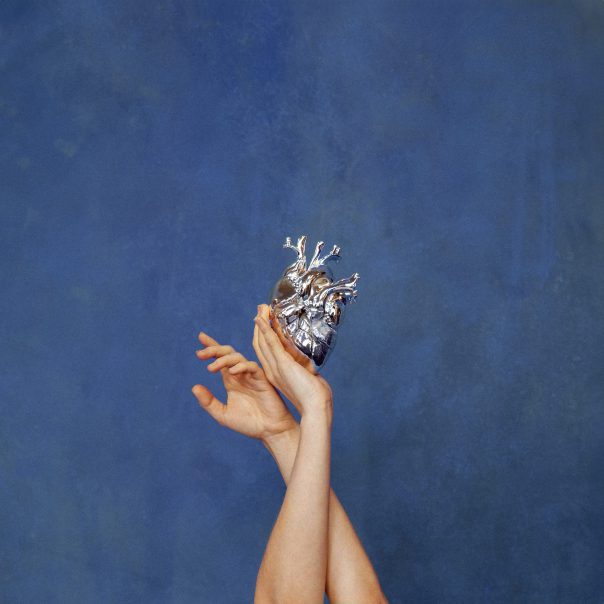ALBUM REVIEW: Aurora continues her fight on ‘What Happened to the Heart?’

Aurora, “What Happened To The Heart?”
“Hit me hard where I am soft/ Should my heart reveal itself to be more than just a muscle,” Norwegian singer-songwriter and fairy princess Aurora sings on “Some Type Of Skin,” off her new album, What Happened To The Heart?
What Happened to the Heart?
Aurora
Glassnote/Decca, June 7
8/10
Get the album on Amazon Music.
That’s a chilling introduction! With a delicacy and softness only she can conjure, she invites listeners to unpack the uncomfortable question to which the world has become oblivious: When did we become so insensitive and detached?
Inspired by a letter written to her by activists calling for a revolution against climate change (a topic dear to her), What Happened To The Heart? is her response.
Aurora studied the anatomy of the human heart—a vital organ both physically and spiritually—as a framework to understanding the state of the world. Throughout the album, she questions the lack of humanity in today’s society and offers comfort and hope.
Like her previous work, most recently with 2022’s The Gods We Can Touch and 2019’s A Different Kind of Human, the album is an open introspection on the human experience. Recorded between Norway, Germany, London and Los Angeles, Aurora collaborated with new-to-her voices like Tom Rowlands of the Chemical Brothers and Chris Greatti (Yungblud, Poppy, Willow, Blink-182, Pussy Riot), adding new sides and depth to her sound.
“We are good people/ And we deserve peace/ My God it’s a lot,” she sings on “Some Type Of Skin,” the video for which shows her moving past mannequins, a comment on how she feels like she’s speaking to deaf ears.
Album opener “Echoes Of My Shadow” begins like a prayer. Like a guardian angel, Aurora sings life and hope back into the world. The chorus is a sonic explosion with Nordic elements of “kulning,” an ancient singing technique. “Stay in the light my dear/ Until the love you crave falls in your arms,” she sings. Her voice is enchanting and smooth, like a balm over all the tension.
Her ability to connect lies in the way she creates a mythical spiritual universe through vivid storytelling and arrangements that add even more color to the stories. The solitude she sings of comes from spending much of her childhood in forests. The heart is associated with love, of course, but it’s also the map she uses to understand these issues around her.
Pop and disco beats becomes Aurora’s way to alleviate the intensity of her lyrics and message. They also show another side to Aurora Aksnes, who turns 28 in June. Her more playful side would prefer to just dance and live in ignorance, though of course the urge passes. These ideas pop out on “To Be Alright,” a disco and pop banger that carries Madonna energy through its layered harmonious vocals and a ’90s-like dance tempo.
“I don’t want to fight/ I just want to feel all right” she sings. Her voice switches between soft soprano and a baritone, creating the idea of a conversation. One voice asks whether “life [is] worth living if you don’t need for anything.” The other just wants to “feel what the people talk about,” without a care in the world.
“Your Blood” is the most contemporary song on the album, at times recalling the Cardigans. It’s catchy and upbeat while showing Aurora’s range as a vocalist. “I refuse to die,” she chants angrily switching between pitches. Then, later: “You are done,” she asserts, suggesting victory over an unspecified foe. There’s an urgency and concern, but one that’s not as heavy as prior albums.
“Why do we have to die for us to feel the light?” she asks on “Starvation” over psychedelic electronic beats. The song starts calmly with hints of Nordic folklore. As it builds, she keeps asking more questions and the song explodes into a frenzy. All that’s left is chaos. And at the end of danceable tune “My Body is Not Mine,” Rowlands makes his presence clear as the song goes into an industrial, electronic breakdown.
“The Essence” may end up being the album’s most liked song because of how simple and honest it is. Over tropical acoustic strumming, Aurora again uses vivid imagery to communicate pain and how time becomes futile in easing it. She takes some long pauses, as if she’s thinking out loud or trying to find the words to admit defeat.
“It hurts so much to be in touch with the essence of us/ It hurts so much to be in touch, so I’d rather not,” she sings.
Follow Dumisani Mnisi at Twitter.com/nairobi_1899 and Instagram.com/nairobi_1899.
